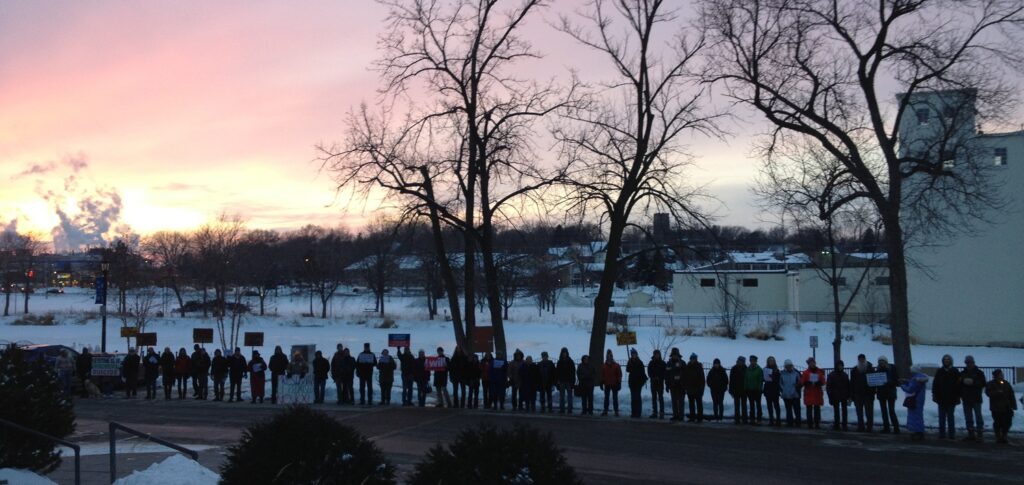A Deeper Change
This blog is written by Shodo Spring, the 3rd place winner in ecoAmerica’s 2023 #EveryoneEveryDay Photo Contest.
This photo is from Northfield, Minnesota, where a group of us gathered in 2014 to show our support for the earth and our opposition to the KXL Keystone Pipeline. I love the picture, which places human protest in the big context: river, sunset, trees, and town.

I had first gotten involved with the KXL in 2011, going to the White House along with hundreds of other people organized by 350.org. I listened to speakers from indigenous tribes living near the tar sands, to labor environmental activists, and many more. I had worn my Zen priest robes to be arrested on the day of religious activists, Months later in a Zen, while sitting in meditation I saw pictures of people walking the pipeline. Finally, I accepted the message and organized the Compassionate Earth Walk. We walked the northern KXL route for three months, talking with hundreds of people and forming deep connections with the earth, our bodies, the prairies and the ranchlands where we spent our days until we arrived safely at our destination in Steele City, Nebraska.
The KXL was stopped after years of resistance by thousands of people. The Dakota Access Pipeline was built, but something else happened there involving indigenous leadership. Instead of talking about maintaining “the American Way of Life” we are now talking about respecting life, protecting water and earth, honoring the people who have lived in harmony with the natural world for generations.
“Defend the Sacred” is our way now.
I loved walking, and would do it again if I didn’t have to work for a living. That protest at the river was a thing we can do from home. There are many such things, including boycotts, pro-cotts (supporting ethical businesses), lifestyle changes, and of course lobbying and donating. I’m writing now about something to add, a way of being rather than a particular action. It’s easier to explain by story than by logic, so here are some examples from my own life.
I live in the country on a few acres. When taking care of the land, I do it with an attitude of friendliness and learning. Often I’ll speak to a weed that I need to pull, or mentally check in with its neighbors about what’s really needed here. This is a way of changing my own attitude from control and killing to living in harmony, acting like family more than the owner. For me, it makes gardening more pleasant, more like visiting than work.
Another thing is asking for help. Remember that for most of human history, people did ask for help, whether from God (by any name), from plant or animal spirits, or whatever. I’m inviting you to get the feel of this – not an idea about what’s true, but a play-experiment in changing your relationship with the natural world around you.
It goes something like this: Think in terms of changing your attitude, not focusing on results. Remember that every day and every moment is a gift; we’re looking at more of the same. Decide who you’ll ask, without worrying about it: your favorite tree in the garden, a meadow, a river, a mountain — something nearby so you can visit. Then act as if you were visiting a respected friend: dress nicely, maybe bring a small gift. After you’ve said hello, bring up your subject, ask for the help you’re thinking of, spend some pleasant time together, and listen for any answer that might come. It probably won’t be in words.
You might feel silly doing it; don’t mention it to people who would make fun of it, but maybe you have friends who are inclined that way. The first time I did this, I had been worried that someone was going to build a house in the woods, just north of my place, and my beautiful private land would be ruined. So I walked through those woods and just asked them to protect themselves. Afterward, I felt better, and just let it go: that’s the main result. It also happens that the woods are still there. And, in the years since then, I discovered that lots of people understood what it’s like to do this. So let me encourage you to give it a try. Don’t change your beliefs or anything, just explore a little attitude shift.
About ecoAmerica
ecoAmerica is moving society toward climate solutions by inspiring and empowering trusted national health, faith, and civic institutions and their millions of stakeholders across America to visibly act and advocate. We help national mainstream organizations elevate their climate leadership, providing them with strategy, tools, and resources to demonstrate visible climate leadership, empower climate literacy, engage all constituents, and build collective action and advocacy. We help our partners transform into national climate leaders to inspire others on solutions. ecoAmerica.org